Ramp of Approval
In August of 2014, I wrote an article called "Metamorphosis" where I first explained our transition to the two-block model (aka two blocks a year, each with a large and small set). In that article, I told you all that we were going to stop producing core sets. Many were curious about how we expected beginners to learn to play without a core set as a ramp into the game. I said that as soon as we had information about what the replacement was going to be, I would tell you all. Well, today is that day.
Ramping Up
Let me start by explaining our "ramping" philosophy. The idea is that we want to create a path for someone who knows nothing about Magic to begin playing, and then have a series of products that allow them to slowly acclimate to the game. The metaphor I like to use is a zero-entry pool. That's a pool where there is a slanted floor and you can walk into the pool. It matches how a lake or ocean meets the shore at the beach.
The idea is simple: you can start with the water being less than an inch and then slowly advance at whatever rate you're comfortable with. You will eventually be able to get to the point where the water is deep, but not until you are comfortable enough that you have chosen to wander that far.
When we stepped back and looked at our entry ramp, what we found was that we had a major gap. To use my zero-entry metaphor, players were able to start wading in, but then at the one-foot level, there was a drop-off to three feet. It wasn't gradual and was a bit intimidating.
Let's take a look at our existing lineup of products so I can show the space we were trying to fill.
First Product—Sample Decks and/or Magic Duels
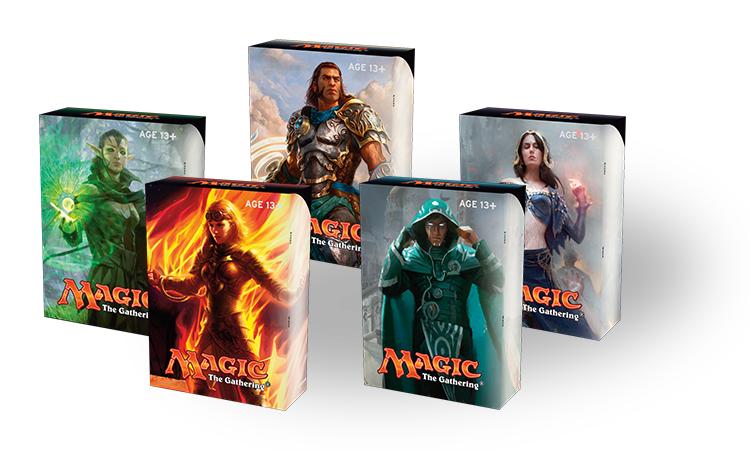
Sample decks are 30-card monocolor decks built around a Planeswalker. They're given away for free (usually from stores but also at certain events) and are designed to be a simple first-time play experience. Each deck has a light theme and includes commons, uncommons, and a single rare (which is usually splashy and fun but not a tournament staple that would make non-beginners want the decks). The cards in the decks are Standard-legal and you can combine any two sample decks to make a deck legal at a Standard tournament.
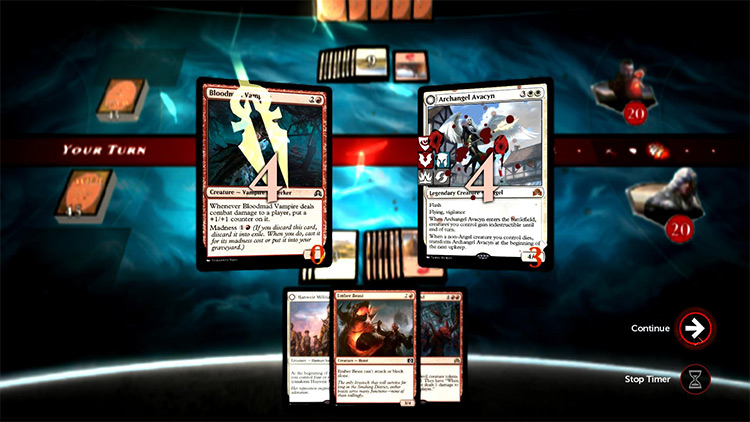
Magic Duels is a digital way to play Magic and is available on a number of platforms (Xbox, ioS, and Steam on PC). It has a built-in tutorial and various campaign adventures, and allows you to build your own deck to play against either the computer or other players. There is the basic game and then add-ons for various expansions.
The reason these two products are designed to be the first experience is fourfold:
- They're both free to play. We want the new player to have the ability to sample the game without having to spend any money.
- They have a simple play experience. Both sample decks and the beginning of Magic Duels are designed to introduce players to the game without overwhelming them with the complexity that the full game offers.
- Both are flavorful. The sample decks and Magic Duels were both designed to play up the flavor of the game. They both use planeswalkers as a focal point to start.
- They allow a beginner to learn. Sample decks are intended to be distributed at places where there is a human available to help teach the new player. Magic Duels has its "teacher" built into it. Trained humans and smart AI have proven to be the best means for teaching people how to play.
Second Product—???
This was the area we needed to fill. Core sets were supposed to fill this slot before, but we found that randomized boosters made for a very inconsistent experience. Part of easing you into the game was keeping a continued focus, which the core sets weren't particularly good at.
Third Product—Deck Builder's Toolkit
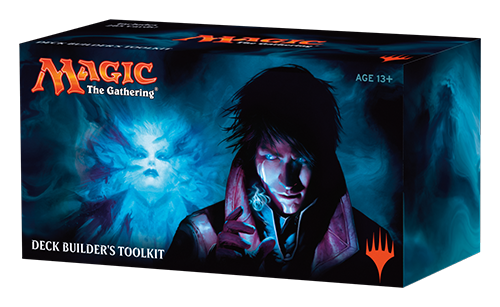
Once players have the basics, we've found the best way to help them start deck building is to give them access to a bunch of cards. The Deck Builder's Toolkit is designed to be that product. It gives players a volume of cards (285 total, mostly loose but a few in booster packs of recent product) along with some deck themes to help get them started. Notice that deck building doesn't happen until the third product in the line, because it's one of the more complicated aspects of the game.
Fourth Product—Expansion Boosters
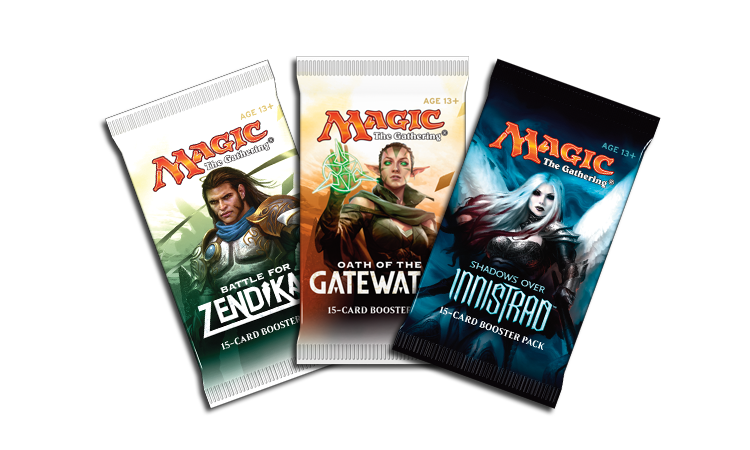
Finally, it's time to introduce the bread and butter of the game to the new players: the expansion boosters. This is obviously the focus of the game, and it is the thing new players will always be driven to by other invested players because it's where the most excitement lies.
Filling in the Gap
The first thing we did was try to figure out the goals of the product that was missing.
- It has to be preconstructed
Deck building is a fun part of Magic, but it's an added complication and we didn't want players focusing on it until the third product, so we knew we wanted this product to be pre-built and playable out of the box.
- It has to keep the same focus
As I mentioned above, we want the early products to keep a cohesive focus. That meant we had to look at what the first products were doing and then stay consistent. Both sample decks and Magic Duels had a strong Planeswalker focus, so that is where we started.
- It has to properly transition
On one side, we had products that delivered the simplest gameplay. On the other, we had a product where you built your own deck. That meant that this product was somewhere in the middle. We built the deck for you, but it could be a little more complicated.
- It has to be part of the larger product line
Another problem we had with the core sets is that it was about something different than the rest of Magic. New players look to established players and the established players are all about the current set. This product had to be something that didn't stand alone but felt like an integrated part of the current Magic world.
- It has to be exciting
We didn't want this product to be something established players felt obligated to buy, but we also didn't want them dismissing it to the players who had it. It needed to walk a tightrope between being cool enough that the established players wanted to take a look at it, but not so compelling that they felt they had to buy it.
That's a lot of restrictions, but we were determined to find something that addressed them all. I'm happy to say we did. So, it's time for me to introduce you to the new product that will be replacing Intro Packs, and then walk you through what it contains and our thoughts behind it.
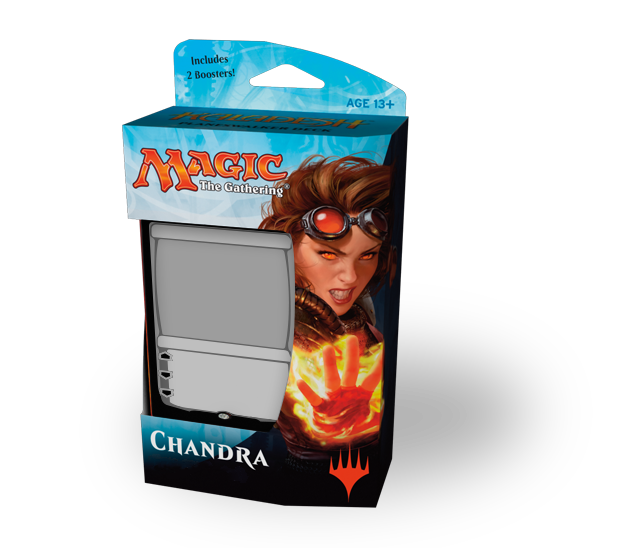
Here's how they're going to work. Each set will have two Planeswalker Decks, each built around a different Planeswalker. Those Planeswalkers will be characters relevant to that block. Each Planeswalker Deck will be a preconstructed 60-card deck and will be packaged with two booster packs from that block with an MSRP of $14.99. The Planeswalker Decks will be released in each of the eleven languages that Magic is published in.
The decks will play into mechanical themes of the block, most often making use of a new keyword mechanic. The default will be that the decks will be two-color even if the Planeswalker is monocolor. (Remember that a "default" means that's what we will do most of the time, but we reserve the right to change things up if we feel a particular Planeswalker Deck wants to be different.)
The other big difference about Planeswalker Decks is that there's going to be five cards in each that won't be found in the expansion, but that will be considered connected to that block for Standard legality (meaning Planeswalker Decks will be playable in Standard). Here's what you can expect:
- One copy of a mythic rare planeswalker
Each Planeswalker Deck will have a brand-new planeswalker card, obviously of the Planeswalker the deck is themed around. These cards are being designed to be fun and flavorful but not pushed for tournament play. The idea is we want new players to be excited by them and for them to have a big impact on the game, but we don't want established players to feel obligated to buy the Planeswalker Decks. As a default, the planeswalkers will be expensive to cast and splashy. There will be one copy of this card in the deck, with art tied to the appropriate world.
R&D spent a lot of time debating whether or not the decks should have planeswalkers, and ultimately decided that we couldn't have a Planeswalker focus to the decks without having a card that actually represented them. We felt very strongly that the Planeswalker focus was key. We then had an even lengthier debate about how the planeswalkers should be designed. How many loyalty abilities should they have? Ideas ran the gamut from three to zero. In the end, we decided that we wanted them to work like all the other planeswalkers, but that we would make sure to design them more with beginners in mind.
- Two copies of a rare spell that has an effect and also tutors for the specific planeswalker
It was important to us for the deck to have a planeswalker, but we wanted it to be mythic rare—which meant that each deck could only have one. Was there a way to help the planeswalker have a big impact if only one was in your deck? The rare was our solution to this problem. The rare usually will cost one mana less than the planeswalker (to help ramp into the planeswalker) and have an appropriately themed effect. It will then search your library or graveyard for a copy of the specific planeswalker and put it into your hand. (Note that it only looks for the Planeswalker Deck's version of the planeswalker and not any version. Allowing you to get any version had huge developmental issues.) This functionally allows the player to have three copies of their planeswalker, which will increase the chances that it makes its way into play. There will be two copies of this card in the deck and it will have art tied to the Planeswalker.
- Three copies of an uncommon permanent that is enhanced by having the planeswalker on the battlefield
For the uncommon, we are making a permanent that is upgraded if you have the relevant planeswalker on the battlefield. Note that unlike the rare spell, the uncommon is looking for any version of the planeswalker—not just the one that comes in the Planeswalker Deck. This card will be thematically tied to the Planeswalker of the deck in name and art. There will be three copies of this card in the deck.
- Four copies of a common flavored to the Planeswalker
At common, we have a basic staple effect—one the Planeswalker would cast most often, with art showing them casting it. There will be four copies of this card in the deck.
- Four copies of an appropriate common dual land
Oath of the Gatewatch and Shadows over Innistrad introduced a ten-card cycle of dual lands that enter the battlefield tapped. It is our intention to make sure that ten-card cycle stays Standard-legal so that budget players will always have access to them. For Planeswalker Decks, the plan is to include the appropriate ETB-tapped dual land that matches the colors of the deck. The card will have brand-new art tied to the world of the block. There will be four copies of this card.
That means of the 60-card Planeswalker Deck, there will be four mechanically unique cards with ten total copies in the deck (one of the mythic rare, two of the rare, three of the uncommon, and four of the common). There will be fourteen cards with new art (the ten listed above plus the four copies of the dual land). All the rest of the cards will be from the large set if the Planeswalker Deck is tied to the large set and from the whole block if the Planeswalker Deck is tied to the small set. The art on all those cards will match the art used in the block.
The Planeswalker Decks will premiere with Kaladesh, this year's fall set, where they will replace Intro Packs. I've had a chance to see the first two decks and I think beginning players are going to be in for a real treat.
One last thing before I move on. The above breakdown is our current philosophy of how to make use of the new cards in the product. As the Planeswalker Decks get played and we start getting feedback, we might tweak how we use the new cards.
But Wait, There's More
There's one other change coming with Kaladesh that I wanted to talk about. We're giving a facelift to the Fat Packs, and I wanted to walk you through what was changing. First, we've decided to change the name. The name "Fat Pack" has always been a bit nondescript, so we're changing them to "[set name] Bundle." So with the fall set, we'll be creating the Kaladesh Bundle. It will have an MSRP of $42.99.
Here's what you can expect with the product:
- A box
Bundles will come in a decorative, reusable box. The box will use the key art of the set.
- 80-card land pack
There will be sixteen of each basic land, all from the block the product is named after.
- Ten booster packs
The Bundle will include ten booster packs from the set the product is named after.
- One player's guide
The Bundle will include a player's guide from the set the product is named after.
- One Spindown life counter
The Bundle will include a Spindown life counter tied thematically to the set the product is named after. Each Bundle will have only one Spindown life counter, but there will be five different versions for each set.
- One rules reference card
It's not our intent for beginners to buy the Bundle, but we know that many still will. The rules reference card gives them information to help lead them to Magic Duels, where they can use the tutorial to learn.
The first Bundle will come out in conjunction with Kaladesh this fall.
Make New Products but Keep the Old
My goal today was to introduce you to Planeswalker Decks (and the new Bundle) and explain some of reasoning behind how we put them together. I am very interested to hear your thoughts on the new products as well as this article. You can write me an email or contact me through any of my social media accounts (Twitter, Tumblr, Google+, and Instagram).
Join me next week, when I explain how we mastered the Eternal.
Until then, may you bring some new players to the game and let them try out our new system.
"Drive to Work #330—Storm Scale"
In this podcast I explain what the Storm Scale is and how it will help you have a better sense of which mechanics might return in a Standard-legal set.
"Drive to Work #331—Storm Scale: Khans of Tarkir"
In this podcast, I look at all the mechanics from Khans of Tarkir block and put them on the Storm Scale.
- Episode 331 Storm Scale: Khans of Tarkir (16.1 MB)
- Episode 330 Storm Scale (17.6 MB)
- Episode 329 20 Lessons: Human Nature (17.5 MB)
- Episode 328 Meet My Daughter (14.5 MB)
- Episode 327 GDC 2016 (19.9 MB)

